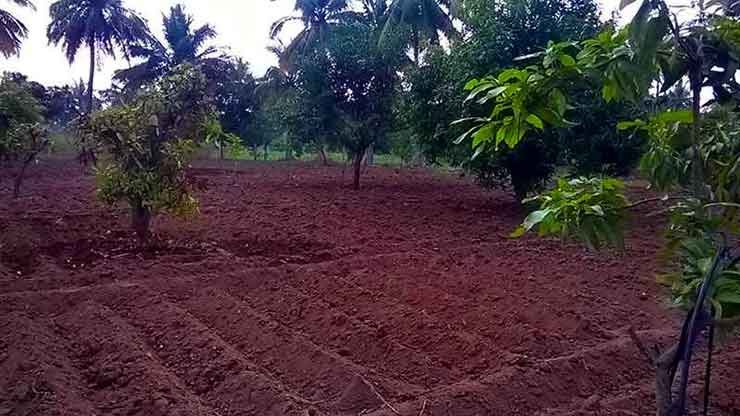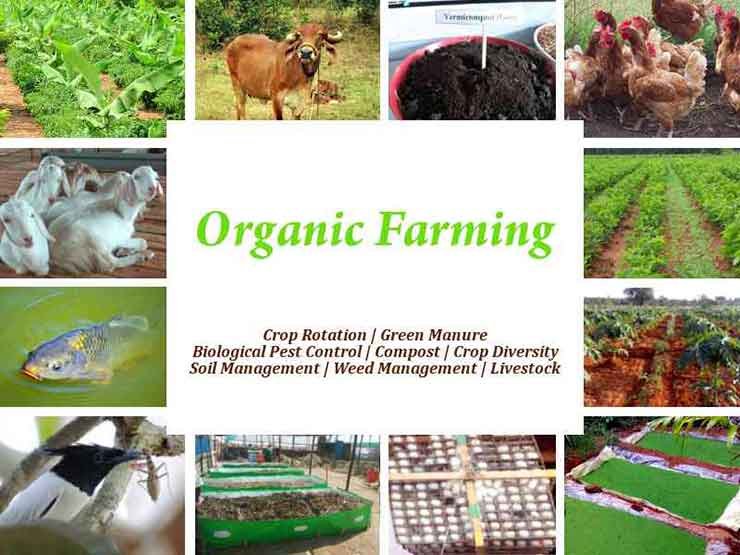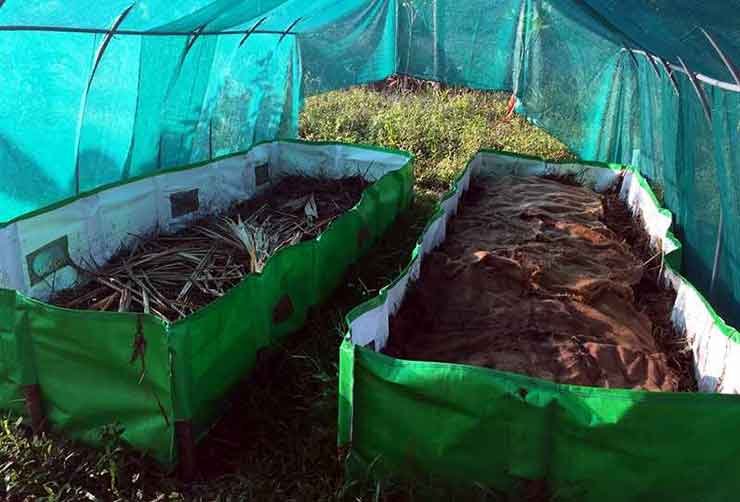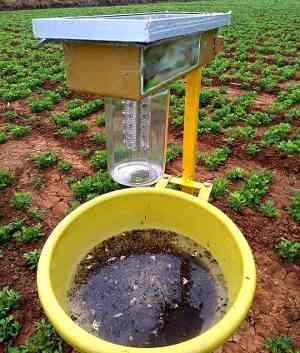Organic farming in India is gaining popularity day by day. One can get organic certification by strictly following organic farming methods. Organic produces have great market value and demand. Learn what is organic farming and how you can convert your land into a certified organic farm.
The system of organic farming is not a new concept and has been in practice since ancient times in India. The primary aim of organic farming is to help soil stay in good health through the use of biological wastes, organic wastes and bio-fertilizers. Using organic manures help in sustainable crop production along with a pollution-free environment. Sometime it is called ‘green farming’. As per the US Department of Agriculture-
Organic farming is a system that avoids or excludes use of synthetic inputs like pesticides, fertilizers, hormones, etc. and relying on techniques like crop rotation, organic wastes, farm manure, rock additives and crop residues for plant protection and nutrient utilization.
Thus, in other words, organic farming is relying on the natural process of yield benefits so as to maintain a healthy soil, eat healthy food and grow healthy humans. There is a difference between organic farming and permaculture. The later depends on organic farming but it also includes lifestyle into organic gardening or farming.
Need for Organic Farming in India

Ever increasing population as opposed to an ever decreasing supply of living resources like food and water has made it necessary to increase the agricultural production and stabilize it in a viable and feasible manner. The benefits of ‘Green Revolution’ credited to Dr. MS Swaminathan have now reached a plateau and with diminishing returns it has become necessary to devise alternate techniques. In addition, the excess use of fertilizers and artificial growth regulators has led to an issue called ‘pollution’. The need of the hour is a natural balance between life and property for existence. Keeping in view the fact that fossil fuels are on their way of extinction and are non-renewable, organic, nature friendly ways of farming and agriculture has gained importance.
Concept of Organic Farming
Organic farming is a very native concept to India. It is based on the following principles:
- Soil is a living entity.
- Nature is the best teacher for farming since it does not use any external nutrients or additional water.
- Organic farming is based on understanding the ways of nature. It does not mine the soil of its nutrients nor does it degrade the soil for fulfilling the needs of the common man.
- The living population of the soil is protected and nurtures. The natural micro-organisms in soil are not harmed in any way.
- The focus in organic farming is the soil itself. The health of the soil and its structure is maintained as it is believed to the most important medium.
Thus organic farming is a system of farming that aims at keeping the soil alive, maintaining its good health, cultivating the land and then raising the crops. This must be done to maintain a pollution-free environment and in an ecological manner.
Salient Features of Organic Farming
Some of the salient features of organic farming include:
- Protecting soil fertility
- Maintaining the level of organic matter
- Encouraging biological activity in soils
- Providing nutrients through the microbial action
- Using legumes to fulfill the nitrogen requirements of the soil.
- Recycling organic matter like crop residues and manures
- Managing diseases, pests and weeds through the use of techniques like natural predators, organic manuring, crop rotation, maintaining diversity, growing resistant varieties, etc.
- Effective livestock management by paying special attention to their nutrient requirements, housing, breeding, rearing, etc.
Emergence of Organic Agriculture in India
In India, organic agriculture is being increasingly adopted by farmers. They can be divided into 3 different categories:
Category 1
For farmers living in a no-input zone, organic farming is a way of life. It has been practiced by them since ages and is a traditional way of doing agriculture.
Category 2
In wake of the ill-effects of conventional agricultural practices and owing to the misuse of fertilizers, farmers who have recently adopted organic farming fall under this category.
Category 3
This category includes farmers who have systematically adopted organic agriculture to capture the market commercially.
Most farmers fall under the first category but they are not certified farmers. Certified farmers are in the third category while both certified and non-certified farmers are included in the second category.
Regulatory Body and Organic Certification
Since India has traditionally been practicing organic farming, there is a regulatory body that ensures quality.
- National Program on Organic Production (NPOP) is the authority defining the regulatory mechanism. They have two different bodies for regulation in the domestic and export markets.
- Under Foreign Trade Development Regulation Act, NPOP looks after the export requirements.
- Under Agriculture Produce Grading, Marking and Certification Act, it looks after the domestic market and imports.
- Agricultural and Processed Foods Export Development Authority (APEDA) is a regulatory body of NPOP as per FTDR Act. It is also the Agriculture Marketing Advisory under Agricultural Ministry.
The NPOP notified under FTDR act is equivalent to USFDA, European Union and Sweden. Hence, products certified under NPOP can be exported to US, Europe and Sweden without the requirement of an additional certification. There are 18 agencies accredited by National Accreditation Body that look into the certification processes. 4 of these agencies fall under the public sector while rest 14 is managed privately.
Organic Farm Management
Since the entire concept of organic farming revolves around a healthy, living soil crop residue management, effective crop rotation, proper cropping patterns etc. must be practiced carefully. This ensures optimum productivity without any fertility loss. In addition, organic systems also respect the natural ecology of the area such as the weather, flora and fauna of the place, the native animals there etc.
One of the first steps in organic farming is to understand the area and basic requirements following which the long term strategies must be addressed. Some of the problems faced by the country are:
- Poor soil health due to loss of organic matter and soil microbes.
- Increased temperature
- Reduced water supply
- Costly high inputs as opposed to lower returns.
To combat the above issues, a productive, sustainable and cost-effective system must be developed. In order to devise a strategy the first few considerations are:
Rain Water Conservation
Rain water harvesting is an important step in organic farming considering the fact that the only source of irrigation are the seasonal rains, local ponds, lakes, and wells. Therefore, percolation tanks, farm ponds must be dug and cultivation must be practiced in bunds or contours.
Soil Enrichment
Since soil is a living entity, it must be enriched to the maximum extent. The golden rule here is to circulate the crop residues, cattle droppings, and every other biological waste back to the field. Every biological waste taken away must be replaced in the field. In other words, every nutrient, waste, and other resources from the field is accountable. In case of soils deficient in nutrients, mineral grade rock phosphate and lime are added through composting or directly. Bio-fertilizers, compost, bio-nutrients etc. must be used. Synthetic fertilizers, artificial nutrients etc. are a strict no-no.
Temperature Management
In wake of ever-increasing temperature and ill-effects of global warming, this is an important consideration. The soil must be kept covered to protect it from heat. Trees and bushes must be planted on the bunds.
Optimal Use of Solar Energy and Other Such Renewable Resource
Renewable and eco-friendly resources of energy like biogas, solar energy, etc. must be used. For machinery, bullock driven pumps and generators are used. Scheduling of crop plantation must be done by effectively using crop rotation throughout the year.
Maintaining Natural Habitat
The natural habitat must not be destroyed or disturbed with through the use of pesticides and other such synthetic chemicals.
Animal Integration
Animals are very important from the point of view of farm management since they are integral in keeping the good health of the soil. Cow dung and poultry droppings are very good raw material of organic manure.
Other Techniques
Using techniques like vermicomposting, developing own seed varieties, farm compost production, using botanical extracts and liquid manures are other ways of organic farming.
Organic Farming Methods

In order to certify a farm as organic, there are a set of minimum requirements. You should strictly follow these organic farming methods. These maybe enlisted as below:
Conversion Period
Organic farming in India has some disadvantages also. If the farmers are practicing conventional farming and the field is not fully organic then the farmer must have a conversion plan. The time interval between the beginning of organic operations and certification is the ‘conversion’ period. The exact time period is decided taking into consideration the ecology of the land and its previous use. Conversion period is also applicable if the field is partially organic. However the organic and inorganic fields must be clearly marked and maintained separately. Gradually, over a period of time the entire farm including the livestock must be converted to organic. On an average, the conversion period is three years for perennials and two years for annuals.
Mixed Farming
This is a practice of agricultural farming wherein there is not just cultivation of crops but also other farming such as animal husbandry, sericulture, pisciculture or fish farming, poultry management, etc. In other words, mixed farming is integration of animals into the farming system to ensure soil fertility and crop yield.
Cropping Pattern
Since soil is the essential component of organic farming it is necessary to maintain the health of the soil by practicing effective crop rotations and patterns. Growing the same crop in the field repeatedly must be avoided as this would affect the soil fertility. Cultural practices like intercropping would help soil maintain its vitality. Some people cultivate turmeric, ginger, sweet potato, etc. Mango is often intercropped with elephant foot yam, sweet potato and cassava. Vegetables like cabbage, radish, cucumber, is intercropped with maize. Pepper and onion are often grown together. These practices ensure that the nutrient value of the soil is not lost. In addition, inter-cropping helps in disease and insect pest management effectively.
Planting in Organic Farming
Often farmers forget that they must plant what the weather, climate and soil of the area allows. They must cultivate what is native to the soil. In case otherwise, the species or variety chosen for cultivation must be adapted to the soil. The planting material and seeds must be procured from a reliable source that is certified organic by the authorizing body. In case ‘organic’ ones are not available then chemically untreated planting material should be used. Pollen culture seeds, tissue culture seeds, transgenic plants, genetically engineered seeds are also not allowed.
Manure Requirements

The fertility of the soil must be maintained through use of leguminous crops, green manure crops, etc. Biodegradable materials are used as manures. These materials must be of animal or plant origin. Crop and animal residues must be recycled back into the soil directly or indirectly. Manures like vermicompost, sheep penning, farm yard manure, compost etc. are allowed but chemical fertilizers are not. In case the soil requires mineral-based manuring for organic fields, then the products that can be used for manuring are:
- Mulches, slurry farm yard manure, crop residues from the farm itself
- Chalk, gypsum, calcium chloride
- Wood shavings and sawdust from untreated wood
- Sodium chloride
- Bacterial-based bio-fertilizers like Rhizobium, azospirillum, etc.
- Magnesium rocks
- Vermicomposting
- Plant extracts and plant-based preparations like neem cakes
- Biodynamic preparations
The above products are used only when absolutely necessary. A host of factors like nutritional imbalance, contamination, depletion of natural resources must be taken into account. It is also advisable to contact the certifying agency before using urine, straw, slurry, etc. from other farms. The best way to overcome this is starting a small scale dairy farm which will reduce the cost of organic input and make sure the timely supply.
Pest and Disease Management

Being ‘organic’, as the term suggests use of synthetic fungicides, weedicides, pesticides are prohibited. Natural enemies of the pests are grown and protected. For example, planting a tree in the farm or constructing a bird nest would encourage growth of birds. Birds are natural enemies of insect pests. Hence, the pests are dealt with in a natural manner. Using genetically engineered organisms are prohibited to control the diseases and pests. For weeds, manual weeding process is done. Weeds near the base of the plants are pulled out and recycled as mulch in the field. Plant based repellents, neem seed kernel extracts, mechanical traps, pheromone traps, clay, soft soap and chromatic traps are permitted for use in the farms. In case of absolute necessity the certifying agency must be consulted and the following products must be used:
- Mineral oils like kerosene
- Plant and animal preparations
- Bordeaux mixture
Crop pests have some natural enemies like Micromus, Coccinellids, Syrphidae, spiders and campoletis. Studies have shown that coccinellids reduce leafhoppers and spiders twice as efficiently in crops like potatoes, maize, cotton, groundnut and soybean. Spiders are also effective for the said crops in controlling many insects.
Profitability of Organic Farming in India
If the right market can be accessed then organic farming in India is very profitable. Profit increases in mainly two ways-
- Cost of farm input reduces by using crop and animal residue, organic waste as bio-fertilizer.
- Market value and demand of organic product is high compared to traditionally grown farm produces.
There is also a very good export potential of organic produces but organic farming methods must be strictly followed and along with organic certification from authorizing body.
Conclusion
To conclude with, organic farming in India is a safe venture although it may take a while to establish and become fully functional. There are government subsidies available for the commercial aspects. If organic farming methods can be strictly followed, required organic certification is acquired and have access to the right market then organic farming in India is very profitable.
Reference
- http://agritech.tnau.ac.in/org_farm/orgfarm_introduction.html
- http://megapib.nic.in/org_farm_comp.htm
- http://apeda.gov.in/apedawebsite/organic/Organic_Products.htm
- http://pgsindia-ncof.gov.in/pdf_file/Operational%20Manual%20for%20Local%20Groups.pdf
- http://www.icar.org.in/files/Base-Paper-Organic-Farming-%20Base-16-03-2015.pdf
- http://vikaspedia.in/agriculture/crop-production/organic-farming
- Organic Agriculture (Concept, Scenario, Principles and Practices) by A.K. Yadav
- Certification and Inspection Systems in Organic Farming in India

This helped me a lot in my project and there are many informative points which i could use for my project.
Hello sir I am interested in organic farming in my land, but I have no knowledge about organic certification and about buyer and sellers. So please give advice.
How much land you have?
R/sir , I want to adopt natural /organic forming with certification from authorities,please advice me or give me a direction.
Is the natural farming and organic are same
They are different. Natural farming is done without any external efforts like tilling, manuring etc. In natural farming farmers allow nature to do her work. On the other hand organic farming is same as the traditional farming but uses only organic fertilisers, manures, pesticides etc.
I am highly intersted to work in eco farm. That’s why I need to a chance to work in this farm.
I am from Bangladesh
I want to do organic farming in my land. I have 2 acre land. Plz suggest.
Dear Sir/ Madam,
Am based out of Gurgaon- Delhi NCR.
For the longest of the time am interested in starting organic farming.
Did try some organic farming out of leased land closed to Gurgaon but the land prices are so expensive and places are so far that it becomes a deterrant.
I need some help to understand which place close to Gurgaon will be suitable for organic farming where I could buy lands at cheap prices.
Or if there are suitable places where I could find land away from Gurgaon.
Awaiting to hearing from you.
Thankyou and regards
Dear Sir/Madam,
This is Chinni Kishore Working as a Manager in PINAKA AEROSPACE.
my wife having 10 acres land in a single bit.
So, i want to start organic farming. would you suggest me i have few doubts.
Hey there, I loved the way you explained the concept in a crystal clear manner and I am so glad that you posted a blog on organic farming. Earlier, I wasn’t knowing much about the concept but after going through your blog post, it made me clear the doubts in my mind. Thanks
I am interested in purchasing a small plot of land on which I can build a small house and also do organic farming by using natural fertilizers only. I don’t have an agricultural background. Can you provide some guidance?
Hello sir,I am very much interested in organic farming. I have no idea about it will you please guide me
Hello, I am a student from Solapur, Maharashtra. I am interested in organic farming. I would be grateful if anyone can provide me guidance regarding the same. I have a 10 acre land
Sir, I want to syart organic farming in my area at paschim medinipur, westbengal. Please guide me where to start for ex nature of soil, pest control, suitable crop, marketing of products etc
Where and how to buy govt approved organic farm land near Delhi?
Hi sir, I am very much interested in organic forming and ur blog is very good about organic forming.
I am from Krishna District in Andhra Pradesh, one of my friend had some agriculture land near to my home town, there we are planning to start organic forming, please help me out where to start and how to start.
Actually we are planning to start organic vegetables and Leafy vegetables.
New to Agriculture. Need your Full Guidance and Support to start Organic Farming as A Business with My Hard Earn Money.
Will Appreciate All Your Help
hi
i am from Faridabad and have 10 acre of land the Mathura distt.
I am interested in organic farming.
Pls. guide.
Sir I am also interested in organic farming and it’s certification. I am trying to do farming on my 20 acre land. Please guide me.
Hello, sir I am interested organic farming for reading your artical this is very help full artical for planning for Organic farming in India.